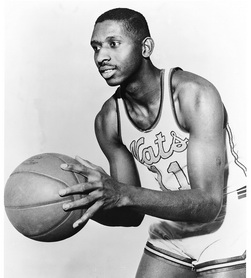 Earl Lloyd
Earl Lloyd
3 1/2 years after Jackie Robinson broke major league baseball's color barrier, Earl did the same in the N.B.A.
Until then, the only option for black professional basketball players was the Harlem Globetrotters, because N.B.A. team owners excluded black players.
But in the April, 1950 player draft, everything suddenly changed.
(story continues from "Read More")
Despite the resentment of some other owners, in the 2nd round of the draft, Boston Celtics owner Walter Brown chose Chuck Cooper, a black player from Duquesne University.
Ned Irish, who ran the New York Knicks, announced his intention to purchase the rights to Nat "Sweetwater" Clifton from the Globetrotters.
And in the 9th round, the Washington Capitols picked Earl Lloyd, a forward from historically black West Virginia State University.
On the night of October 31st, 1950, 21 year old Earl took the court to play against the Rochester Royals (now the Sacramento Kings) in Rochester, New York.
When the announcer read Earl's name, a white man in the front row shouted, "Do you think this nigger can play basketball?"
Sitting right behind this man was Earl's mother. She leaned over to him and assured him not to worry. "The nigger," she said, "can play."
The game itself was played without incident, and Earl scored 6 points and took a game high 10 rebounds.
The next night, Chuck Cooper debuted for the Celtics and three days later, Sweetwater Clifton did the same for the Knicks. All three black players went on to fine N.B.A careers.
Earl didn't receive racial taunts from teammates and opponents but endured racial animosity from some of the fans.
And various hotels did not allow him to stay, nor did some restaurants serve him. But Earl understood racial bigotry and conducted himself as a gentleman.
During the Korean War, Earl left basketball to serve in the U.S. Army, and then returned to play eight seasons in the N.B.A., the last two with the Detroit Pistons.
He retired as a basketball player following the 1960 season.
For his career, Earl averaged a respectable 8.8 points and 6.4 rebounds per game, and he was considered a stellar defensive player as well.
Later Earl became a television basketball analyst, an assistant coach, a scout and the Detroit Pistons' first black head coach.
After leaving professional basketball, Earl worked for the Detroit Board of Education, became a Chrysler executive and later worked for Dave Bing, Inc., an auto parts company founded by one of his former players, Dave Bing.
But aside from his wife Carlita, and their three sons, it was basketball that captured Earl's heart, and in 2003 he was honored to be inducted into the Basketball Hall of Fame.




